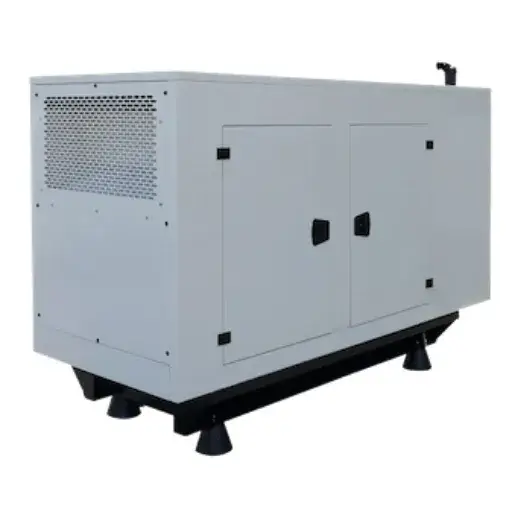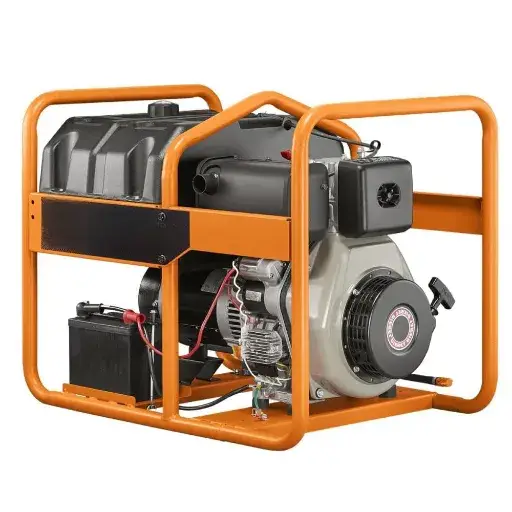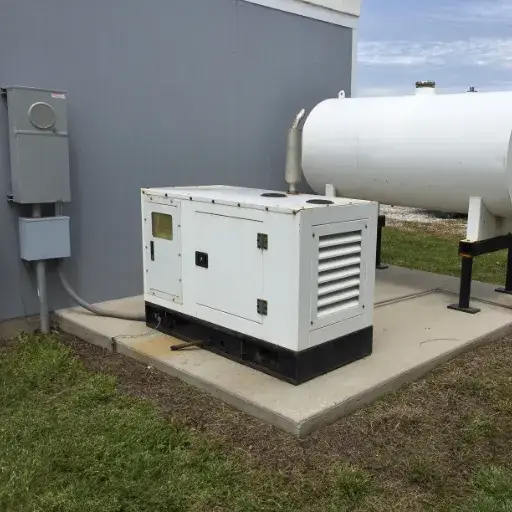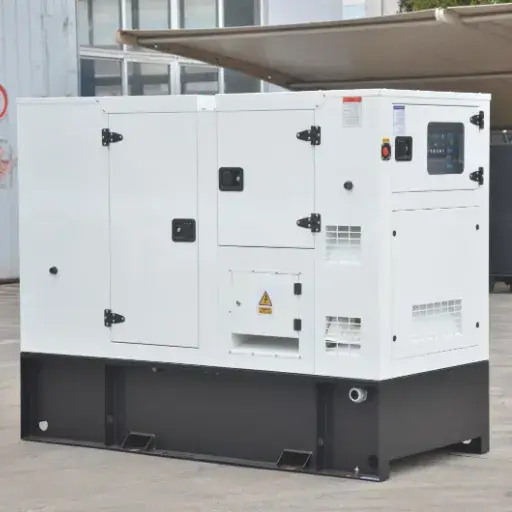Overview: Diesel-powered generators remain the number one choice for reliable and efficient energy solutions across industries. These powerful machines deliver consistent performance during power interruptions and in remote locations, serving construction sites, manufacturing plants, hospitals, and data centers. This comprehensive guide explores why diesel generators are trusted worldwide for their versatility, cost-effectiveness, and their role in delivering essential services.
Introduction to Diesel-Powered Generators

Diesel-powered generators are trusted machines capable of producing electricity in diverse environments. They convert diesel fuel’s chemical energy into mechanical energy, which is subsequently converted to electrical energy. Due to their toughness and excellent performance, these generators are extensively used in emergency backup systems, construction sites, grid-isolated areas, and industries requiring an uninterrupted power supply.
The ability to handle heavy loads and run for extended hours makes them optimal for powering essential services and infrastructure. Diesel generators remain the preferred choice due to economical operation, longevity, and uniform output under challenging conditions.
What are Diesel-Powered Generators?
Diesel-powered generators are dependable machines that convert diesel fuel into electrical energy through internal combustion engines. Their robustness and stable power supply capabilities in difficult conditions drive widespread industrial adoption. These generators comprise two main components: a diesel engine and an alternator. The diesel engine burns fuel to produce mechanical energy, which the alternator converts to electrical power.
Essential in hospitals, data centers, and construction sites, diesel generators provide backup power during grid failures and enable operations in areas inaccessible to the grid. Recent technological developments focus on fuel efficiency, emissions reduction, and sophisticated control systems, creating sustainable and reliable solutions for both large- and small-scale applications.
Importance of Diesel Power in Industrial Applications
The industrial sector heavily relies on diesel power for reliability, efficiency, and adaptability to varying working conditions. Diesel provides primary or alternative power supply across manufacturing, mining, transport, and building sectors. Strong performance and durability make diesel generators the preferred option for continuous long-term operation—essential for operational continuity during power interruptions or in inaccessible areas.
New-generation diesel engines incorporate state-of-the-art technology, enhancing fuel efficiency and mitigating environmental impact through reduced emissions. Their wide range of applications ensures the supply of diverse industrial power requirements, making their presence essential to global industrial infrastructure.
Overview of Generator Sets and Their Components
Generator sets (gensets) are critical machines that provide backup or primary power, depending on application requirements. Typical generator sets comprise several main components: engine, alternator, control panel, fuel system, and cooling system. The engine, usually powered by diesel, natural gas, or propane, provides mechanical energy. The alternator converts engine power into electricity. The control panel offers operational controls and monitoring, ensuring efficient, safe generator operation. The fuel system provides and regulates fuel supply, while the cooling system prevents overheating during extended operations.
These perfectly coordinated components deliver reliable power meeting diverse residential, commercial, and industrial energy needs.
Types of Diesel Generators

| Generator Type | Description | Primary Use Case | Capacity Range |
|---|---|---|---|
| Portable | Small, movable units | Temporary power needs | Up to 10 kW |
| Standby | Backup power source | Emergency power | 7 kW to 3 MW |
| Prime | Continuous operation units | Remote locations | Varied capacity |
| Industrial | High-output, durable units | Large facilities | Over 3 MW |
Industrial Diesel Generators
Industrial diesel generators are engineered for high power output and continuous, reliable operation in demanding environments. These generators serve large-scale industries like hospitals, factories, and data centers, which require nonstop, dependable power. Equipped with robust components, they withstand extended use and reach 3 MW or more, making them suitable for vast operations. Industrial diesel generators are recognized for their operational efficiency and for providing backup power during outages, maintaining essential system continuity.
Portable Diesel Generator Sets
Portable diesel generator sets are small, easy-to-move power sources that supply electricity in hard-to-reach or otherwise unavailable areas. Commonly found at outdoor events, construction sites, and emergencies, they offer flexibility and reliability across diverse settings. Latest statistics reveal rising demand for portable diesel generators, driven by fuel efficiency and long operating times without refueling. Modern portable models feature cutting-edge features, including remote start, noise reduction, and user-friendly controls suitable for residential and commercial use, making them the preferred option for temporary power applications that balance output and ease of handling.
Rental Options for Diesel Generators
Diesel generator rental selection requires assessing exact power needs, rental duration, and budget. Many rental companies offer a wide range of sizes and types, accommodating everything from small residential needs to large industrial projects. Key characteristics include reliable fuel consumption, quiet operation, and user-friendly controls. Most rental firms offer flexible terms, professional installation, and maintenance services throughout the rental period, ensuring reliable performance and peace of mind. Comparing providers yields the best deals regarding price, quality, and service.
Understanding Diesel Generator Specifications

Power Ratings: kVA vs. kW
Differentiating kVA (kilovolt-amps) from kW (kilowatts) is vital when assessing diesel generator power ratings. Both measure power but represent different quantities. kVA measures total electrical circuit power, including both active (usable) power and reactive power. kW denotes active power—the power type relevant to actual appliance and equipment output demands as the already-working power portion.
kVA and kW values are related through power factor (PF), a number between 0 and 1 that typically indicates power usage efficiency. Most industrial and commercial generators assume 0.8 power factor unless stated otherwise. The relationship follows:
kW = kVA × Power Factor
If a diesel generator has a 100 kVA rating with a 0.8 power factor, it delivers 80 kW active power. Overlooking this difference leads to errors, since equipment and systems typically indicate energy demand in kW while generators are mostly rated in kVA. Match ratings based on power factor to ensure the generator’s power rating aligns with the application’s operational requirements. Consult experts or check technical specifications when uncertain.
Fuel Type and Efficiency
Diesel generators are efficient, reliable power sources that always meet challenges. They burn diesel, which has a higher energy density than other fuels, producing more kWh per cubic meter. This translates to high fuel efficiency, especially during continuous or heavy-duty operations. Modern diesel generators achieve extended life and lower lifetime costs through heavy-duty construction and efficient motors. However, fuel availability and emissions regulations should be considered, as they affect operational efficiency and compliance.
Tier Standards and Compliance
Tier standards set by regulatory agencies, such as the U.S. Environmental Protection Agency (EPA), limit emissions from diesel engines and generators. These standards categorize engines into four tiers (Tier 1 to Tier 4), with Tier 4 being the most stringent in terms of pollutant limits, including nitrogen oxides (NOx), particulate matter (PM), and hydrocarbons. Adopting these rules ensures diesel generator operators conserve energy and minimize environmental impact.
Achieving Tier 4 compliance requires manufacturers to fit diesel generators with the latest technologies, including muffler after-treatment systems, SCR (selective catalytic reduction), and DPF (diesel particulate filter). These technologies work together to reduce toxin emissions significantly. While Tier 4-compliant generator investment may seem initially costly, it becomes more cost-effective due to superior fuel efficiency, penalty avoidance, and opportunities for sensitive zone access.
Different regions have their own standards that differ from one another—for instance, EU Stage V regulations parallel EPA’s Tier 4. Companies must investigate local laws when purchasing or operating diesel generators to ensure full compliance and avoid legal or financial trouble. Awareness of the latest regulatory developments, including more stringent emissions limits and cleaner fuel requirements, is essential for operational excellence and sustainability.
Benefits of Diesel Powered Generators

Key Advantages:
- Reliability: Diesel generators are reliable, strong machines providing consistent power during emergencies or remote area operations
- Fuel Efficiency: Diesel engines produce more energy from less fuel than gasoline generators, proving cheaper for long-term, prolonged operations
- Durability: Designed to withstand heavy wear and tear, lasting longer with reduced maintenance needs when properly maintained
- High Power Output: Powerful diesel generators easily supply immense power, suiting industrial plants and large-scale operations
- Safety: Diesel is safer than gasoline as it’s less easily ignited, reducing accidental fire risk—an added advantage for operational use
Cost-Effectiveness and Fuel Efficiency
Diesel generators have a strong reputation for economy and excellent fuel efficiency, particularly compared to other power generation methods. Diesel fuel’s high energy density means generators produce more power per gallon consumed. Modern diesel generator engine technology advancement has achieved very high efficiency levels, reducing fuel consumption and emissions. Recent studies report that diesel engines achieve thermal efficiencies of up to 45%, surpassing those of most other energy sources. Long life and low maintenance costs minimize overall expenses, making them the preferred option for cost-conscious industries seeking reliable, long-term power sources.
Reliability and Durability of Diesel Engines
Diesel engines have a long-standing reputation for reliability and durability, well supported by modern engineering and industry data. These engines endure high-pressure operations and harsh environments, delivering consistent long-term performance. Industry reports indicate diesel engines typically last 20-30 years with proper maintenance, significantly surpassing many engine types. Current search results demonstrate various critical diesel engine applications, including backup power systems, construction, and transportation, indicating these engines work effortlessly under challenging conditions. Strong construction and high performance make them the only dependable choice for industries requiring reliable, long-lasting power solutions.
Versatility in Various Applications
Diesel generators demonstrate multi-purpose applications, appearing as primary power sources across sectors. In factories, they serve as backup power, maintaining critical system continuity during blackouts. Construction sites benefit from their portability and ability to power tools and equipment where power lines don’t exist. Hospitals prioritize these units to maintain operations, such as life-support systems, during outages. Agricultural sectors use them to keep irrigation and drainage systems running. With consistent performance and vast capabilities, diesel generators form the backbone of numerous industries and regions.
Choosing the Right Diesel Generator

Factors to Consider: Power Needs and Application
Finding the generator best suited to your needs begins with assessing power demand by examining the wattage of devices, tools, or appliances. Add starting and running wattages of all devices, ensuring the generator manages peak demand without overload. For general residential power backup, the generator should support essential appliances, including refrigerator, lighting, and heating/cooling systems.
Next, consider the fuel types—gas, diesel, propane, or dual-fuel generators. Gas and propane generators offer portability and quick use, while diesel generators enable longer equipment operation without refueling while maintaining superior performance and efficiency, particularly for heavy-duty applications. Choose fuel based on usage frequency and location.
Finally, consider climate factors and portability needs. Quiet generators are suited to residential areas, while tough, weather-resistant units are best for outdoor or construction applications. Always choose generators with auto-shutoff, low-oil alerts, and inverter technology for stable power output.
Budget Considerations
Budget is the primary selection factor for diesel generators, significantly limiting options. Initially, establish maximum spending capacity considering power requirements and the generator’s purpose. Basic models are economically priced but might lack high-end features like inverter technology or extended warranties. Quality generator investment with robust components proves wise in the long term, saving unexpected repair costs. Include operating costs, including fuel consumption, in total ownership calculations. Balancing price and the functions offered identifies the generator that is ideally suited to your needs.
Consulting with Engineers for Optimal Solutions
When selecting ideal diesel generators, professional engineering consultation is essential. Certified engineers thoroughly evaluate all power requirements, considering load, intended use, and environmental factors, and recommend optimal generator models. They advise on installation requirements, compliance with local regulations, and the integration of new generators with existing systems. Their expertise ensures selected generators operate at maximum efficiency and reliability while reducing the risk of sizing errors. Consulting professionals at project start saves time and money while simplifying installation.
Reference Sources
-
Comprehensive Analysis of Combustion, Performance, and Emissions of Power Generator Diesel Engine Fueled with Biodiesel Blends – Analyzes the performance and emissions of diesel generators using biodiesel blends.
-
Impact of Diesel Fuel Generators on Soil Heavy Metals – Explores the environmental impact of diesel generators on soil contamination.
-
A Frequency-Control Approach by Photovoltaic Generator in a PV–Diesel Hybrid Power System – Discusses the integration of diesel generators in hybrid power systems with photovoltaic generators.
-
Sizing Optimization and Economic Modeling of a Stand-Alone Hybrid Power System – Examines the use of diesel generators in hybrid systems for economic and energy efficiency.
Frequently Asked Questions
What are the advantages of utilizing diesel-powered generators for primary power applications?
Diesel generators are reliable, powerful devices supporting continuous power supply applications. These versatile devices are found in industrial settings and construction sites. Urban areas with critical backup power needs are seeing rising consumption due to higher efficiency and lower operating costs compared to gas generators.
What is the automatic activation process of standby diesel generators?
During power failures, standby diesel generators automatically activate, providing emergency power. An automatic transfer switch monitors utility power, shutting off when the supply fails and starting the generator, creating minimal power interruption. These generators typically serve domestic and commercial purposes, always providing necessary power when required.
How do you choose diesel generator sets?
The right diesel generator set selection is determined through power requirement assessment, including the total wattage your applications require. Check load type (single-phase or three-phase), kVA rating, and use purpose (standby or prime power). Additionally, consider generator fuel efficiency and maintenance activities.
In what manner can industrial diesel generators be utilized in power applications?
Industrial diesel generator power capabilities span diverse applications from construction sites and manufacturing plants to significant events. These generators deliver higher power, enabling extended run times and continuous operation in challenging settings.
Are there different types of diesel generator fuel?
While diesel oil is the primary fuel for diesel generators, some generators operate on biodiesel or other non-conventional fuels. Fuel type selection impacts both generator efficiency and exhaust characteristics. When choosing generators, consider the availability of fuel types in your area.
What are the economic alternatives for diesel-powered generator rental?
Diesel-powered generator rental is recommended for customers with temporary power needs unwilling to spend significantly. Rental companies offer a variety of kVA-rated generators, allowing selection of generators that match power needs without a long-term purchase obligation. Requesting rental schemes and service terms reveals the best rental offers.
Conclusion
Diesel-powered generators remain the trusted choice for reliable, efficient industrial power solutions across diverse applications. Their exceptional reliability, fuel efficiency, durability, and high power output make them indispensable for modern infrastructure, from hospitals and manufacturing facilities to construction sites and remote locations.
Understanding generator specifications, including power ratings (kVA vs. kW), fuel efficiency, and regulatory compliance, ensures optimal selection for specific needs. Whether selecting industrial, standby, prime, or portable units, careful consideration of power requirements, budget, and application type guarantees proper generator choice.
The long operational life and low maintenance costs of diesel generators provide significant long-term value. At the same time, modern technology developments focusing on emissions reduction and efficiency improvements ensure responsible environmental stewardship. By consulting with professional engineers and thoroughly evaluating your specific requirements, you’ll select the diesel generator ideally suited to power your operations reliably for decades.
Key Takeaway: Diesel-powered generators deliver unmatched reliability, efficiency, and versatility across industrial, commercial, and emergency power applications. With thermal efficiencies up to 45%, 20-30-year lifespans, and diverse capacity options from 10 kW to over 3 MW, they provide cost-effective power solutions that meet virtually every requirement. Modern compliance with EPA Tier 4 and EU Stage V standards ensures environmentally responsible operation while maintaining superior performance.
